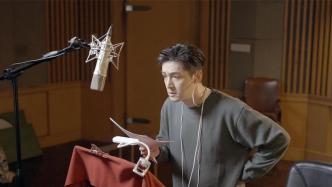
At the 26th Shanghai International Film Festival, a special screening unit entitled "City·Light and Shadow" was added, which included 9 Shanghai films from different periods to commemorate the 75th anniversary of the founding of New China and the liberation of Shanghai. Among them is the classic film "Crows and Sparrows" released in 1949. But this is not a simple re-screening of an old film, but a new production of the film - not only was the picture restored in 2K, but also a special Shanghainese dubbing version was remade for it with the collective blessing of a group of contemporary Shanghai filmmakers.
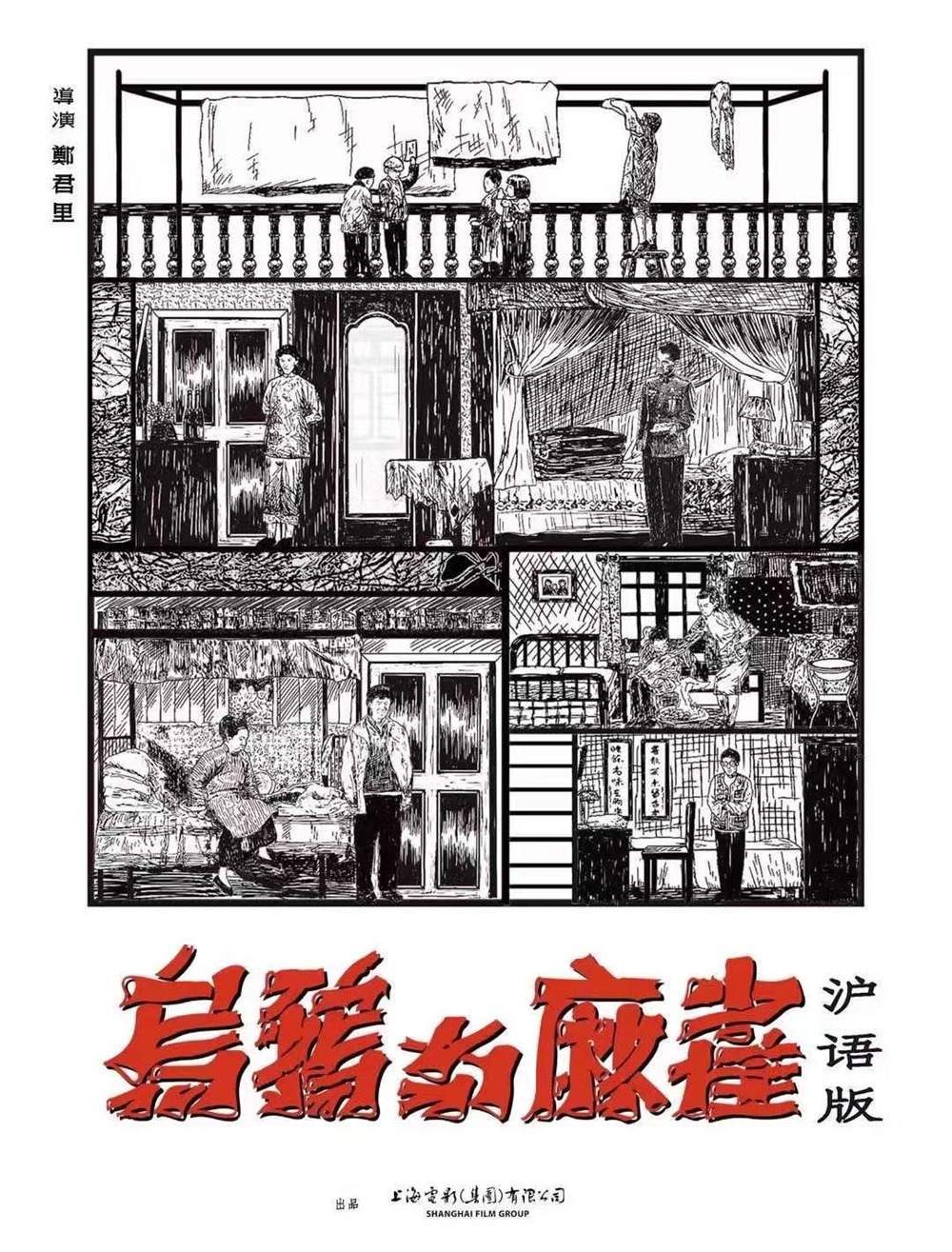
New Shanghainese version of "Crows and Sparrows" poster
There is a principled consensus in the international community on the restoration and renewal of classic films, namely the so-called "restoring the old as it was". In general, the restoration of old films should restore their original appearance as much as possible, rather than using today's technological advantages to make excessive human intervention in the original film. But on the other hand, the purpose of restoring classics is to make them accepted and loved by today's audiences again. Therefore, on the basis of "restoring the old as it was", it must also meet today's screening conditions and adapt to the habits and appetites of today's audiences. For example, while retaining the texture of the film, it is also necessary to improve and enhance the picture quality according to today's projection technology, and convert the original film's monophonic sound track into the Dolby stereo effect commonly used in current theaters. In a word, it is necessary to restore the old as it was, and to bridge the gap between old films and contemporary audiences. This kind of renewal and rebirth is like a bridge across the gully of time, allowing classics to return to people's vision and giving old films new humanistic and artistic values.
The re-dubbing of the Shanghai dialect version of "Crows and Sparrows" is such a classic renewal and rebirth. This year's Shanghai International Film Festival scheduled two screenings for the new Shanghai dialect version of "Crows and Sparrows" on June 18 and 21, which was warmly welcomed by fans and audiences.
Recently, Ishikawa, one of the planners of the Shanghainese version of "Crows and Sparrows" and professor at the Shanghai Theatre Academy, accepted an exclusive interview with a reporter from The Paper, and revealed to us for the first time the behind-the-scenes story of the renewal and remake of this classic film.
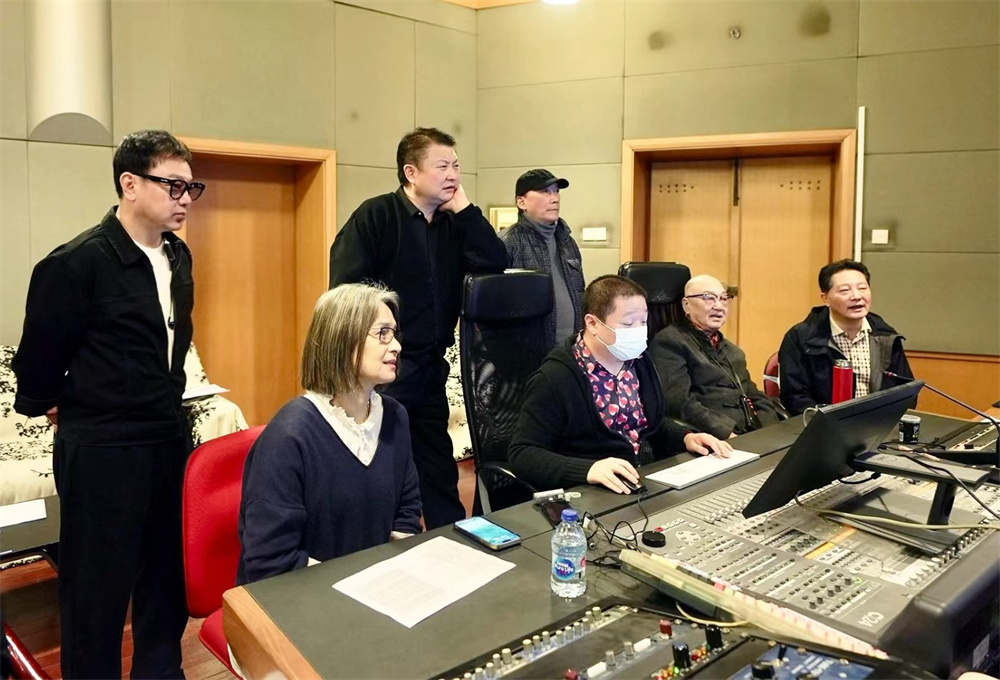
Ishikawa (first from left) in the recording studio with Liu Feng, Qiao Zhen, Qian Cheng, Zheng Dali, Yin Mingzhu, etc. The pictures in this article are provided by the interviewees.
【Oral】
A collective tribute to the older generation of Shanghai filmmakers
The idea of re-dubbing the Shanghainese version of "Crows and Sparrows" first came about three or four years ago. I went to visit Liu Feng, the director of Shanghai Film Dubbing Studio, with Zheng Dali, the son of the film's director Zheng Junli, to discuss the feasibility of re-dubbing. In 2024, it coincides with the 75th anniversary of the founding of the People's Republic of China and the 75th anniversary of the liberation of Shanghai, and it is also the 75th anniversary of the establishment of Shanghai Film Studio. It is an excellent window period, and we made up our minds to make this happen. So, in the fall of 2023, we started preparations.
It just so happened that Zheng Dali had two good friends, Ms. Ye Mei and Ms. Yin Mingzhu, who were both active participants in cultural public welfare activities and senior movie fans. They thought this was very meaningful and were willing to lend a hand. After discussion, Ms. Yin Mingzhu donated a sum of money to the Shanghai Education Development Foundation in the name of "Shanghai Liyang International Freight Forwarding Co., Ltd." and established the "Zheng Junli Film Public Welfare Special Fund" under the foundation, which was specifically used for the production of the Shanghainese version of "Crows and Sparrows". However, this fee is limited to production costs and is a non-profit public welfare cultural expenditure. So our entire production team participated in it without any remuneration.
In late November last year, I met Wang Jianer, Party Secretary and Chairman of Shanghai Film Group, at an event. During the chat, I told him about this matter. Unexpectedly, Chairman Wang was very positive and immediately said that this was a great thing and Shanghai Film Group should give strong support. Later, the relevant leaders of Shanghai Film Group held two project promotion meetings and made specific plans and arrangements for dubbing. At the beginning of this year, the Shanghainese dubbing project of "Crows and Sparrows" was officially launched.
In 2018, we produced a Shanghainese dubbing version for the classic comedy film Big Li, Little Li and Old Li directed by Xie Jin. The team for this film is almost the same as last time, and the production base is also in Shanghai Film Dubbing Studio. Because of the experience of last time, this cooperation went very smoothly. I saw Director Liu Feng looked calm from beginning to end, as if everything was under control and every task was arranged in an orderly manner.
At the beginning of this year, the first step was to sort out the script, which was to "translate" the original Mandarin dialogue into Shanghainese. However, this "translation" cannot be done in today's Shanghainese, but must clearly reflect the characteristics of Shanghainese spoken around 1949, which is quite difficult. This work was personally completed by the famous comic artist Qian Cheng. For example, the Mandarin "nonsense" is said to be "nonsense" in Shanghainese; the Mandarin "moving home" is said to be "moving the field" in Shanghainese; the Mandarin "lonely to death" is said to be "annoying" in Shanghainese; "the people in Nanjing (referring to the National Government in Nanjing) have all sneaked away", and the Shanghainese is "the people in Nanjing are sneaking away!" and so on. He worked very quickly and finished sorting out all the dialogues in just two weeks.
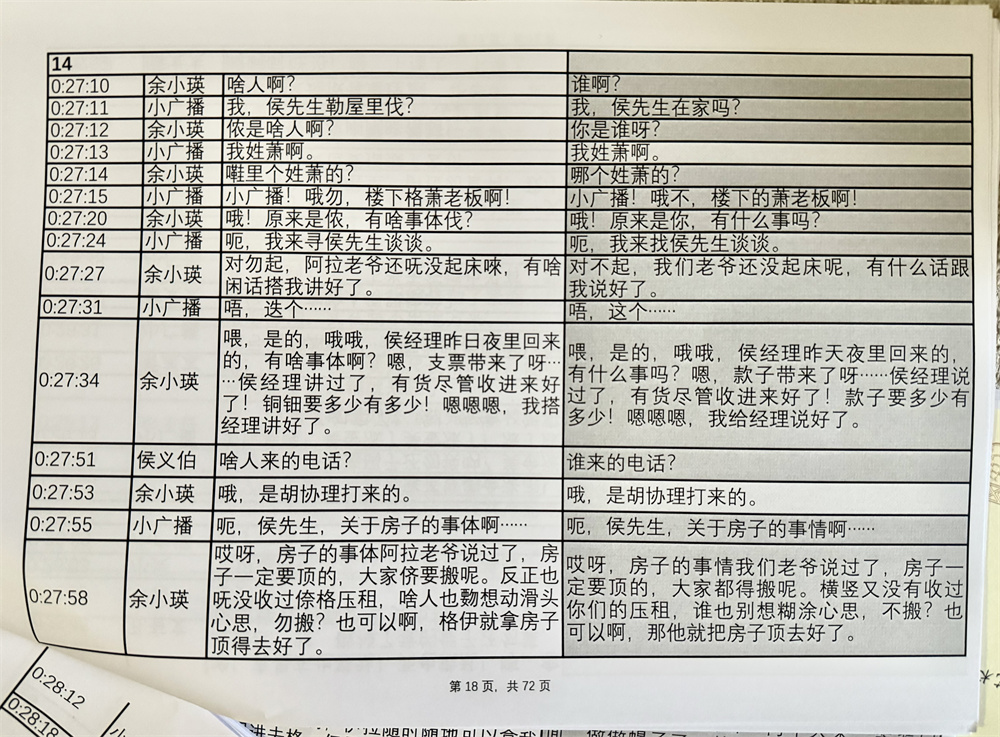
Shanghainese and Mandarin script
Then there is the division of labor among the team. For example, the chief director invited the highly respected dubbing artist Qiao Zhen to personally take charge, and Qian Cheng assisted him as the dialect instructor. In fact, the two of them are the masterminds of the entire dubbing recording. In addition to being the chief director, Teacher Qiao Zhen also personally dubbed the newspaper proofreader Kong Youwen played by Wei Heling. Teacher Qian Cheng had to organize the script, serve as the dialect instructor, and dub the Xiao Radio played by Zhao Dan. A few years ago, he played the role of Xiao Radio in the dialect stage play of the same name. It was perfect for him to dub Zhao Dan this time.
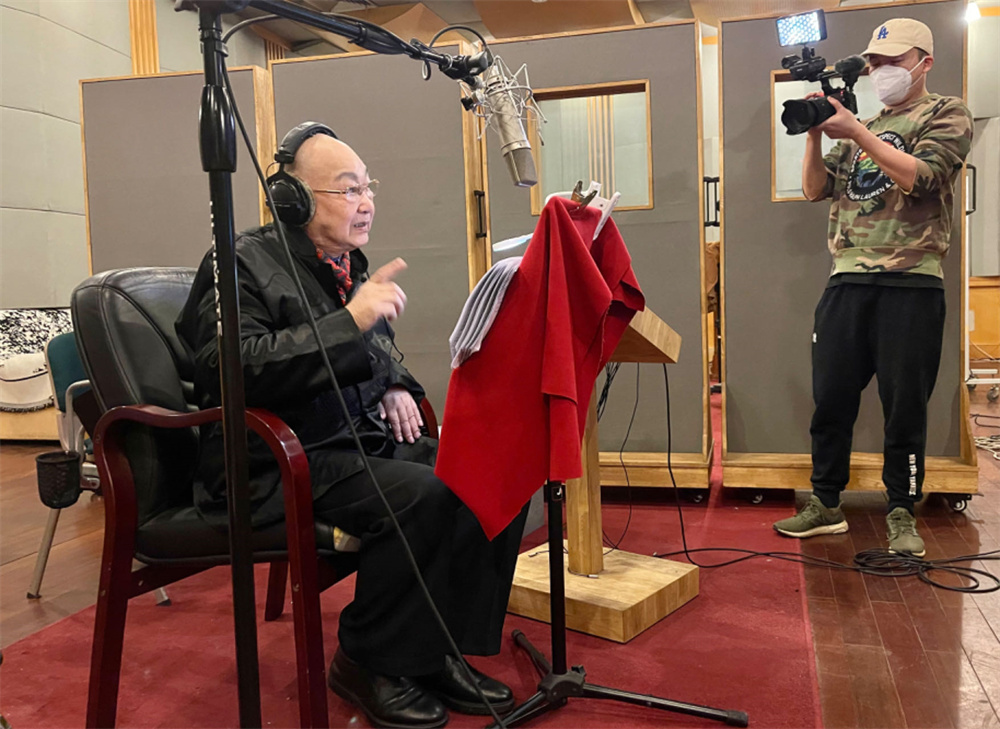
The well-known voice actor Qiao Zhen served as the chief director of the new Shanghai dialect version of "Crows and Sparrows" and dubbed the characters in the film.
Unlike other voice actors, the two old wizards, Qiao and Qian, do not have dedicated and complete dubbing time. In addition to being directors and language instructors at the director's desk, they can only dub in small pieces and fill in every available opportunity.
In particular, Mr. Qian Cheng has become a "versatile extra". If there is no suitable voice actor for those small roles with only one or two lines, he will almost always fill in as a substitute. When I see him changing his voice in the recording studio and dubbing various characters with his hands and feet, I often feel both admiration and heartache.
Teacher Qiao Zhen is over 80 years old and has difficulty walking, but he still comes to the recording studio on time every day with his wife pushing his wheelchair. Sometimes he sits at the director's desk to guide others to dub, and sometimes he has to go into the recording studio to dub his own role. During the lunch break, he and his wife eat a few bites of lunch in the lobby outside the recording studio. This kind of diligent creative state really makes us younger generations feel ashamed.
Ms. Ye Mei and Ms. Yin Mingzhu, who enthusiastically funded the dubbing project, also participated in their own ways. Ye Mei's daughter Hong Hailing studied music composition in the United States in her early years. This time, she also volunteered to re-produce the opening and ending songs for the film. Not only did she retain the original background, but she also corrected the simplicity and shortcomings of the original in terms of instrumentation and timbre. The investor, Ms. Yin Mingzhu, has been a literary and artistic lover since she was a child. This time, she also personally took part in the dubbing "debut" and dedicated her dubbing "debut" to the role of "female guest" in the plot.
Several special considerations behind dubbing casting
Since the film is paying tribute to the older generation of filmmakers, some special considerations and designs have to be made when selecting the dubbing actors. For example, the main actors, Zhao Dan, Wu Yin, Sun Daolin, Shangguan Yunzhu, Wei Heling, Huang Zongying, Li Tianji, Wang Bei... are all representative figures of Shanghai films of that era, and the dubbing casting must be very careful. The dubbing actors must consider not only the appearance and voice that are close to the actors themselves, but also their acting skills and Shanghainese expression ability.
Fortunately, Shanghainese film and television works in recent years, such as "Fanghua" and "Love Myth", have provided us with good examples, from which we can find many excellent actors who can act in Shanghainese, such as Hu Ge, Chen Long, Zhang Zhihua, Zhou Yemang, Ni Hongjie, Chen Guoqing and so on.
For example, Hu Ge, in terms of appearance and voice, is he somewhat similar to Mr. Hua played by Sun Daolin? And Ni Hongjie, who played Gloria in "Love Mythology", has a coquettish voice, which is also very suitable for Yu Xiaoying played by Huang Zongying. Wang Bei was only 18 years old when she played Xiao Amei, and her voice was sweet, clear and bright. Previously, when we dubbed "Big Li, Little Li and Old Li", we invited Mao Shanyu, a famous Shanghai opera actor. At that time, we found that her voice was sweet and clear, and she sounded much younger than her actual age. Naturally, she came to mind again for the dubbing of Xiao Amei this time.
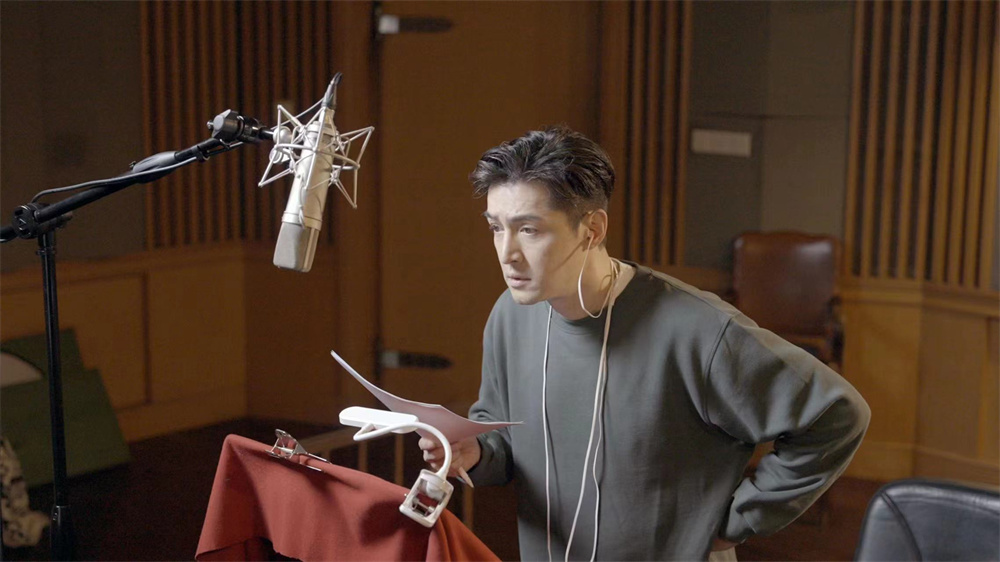
Actor Hu Ge dubbing the character Hua Jiezhi (played by Sun Daolin) in the film
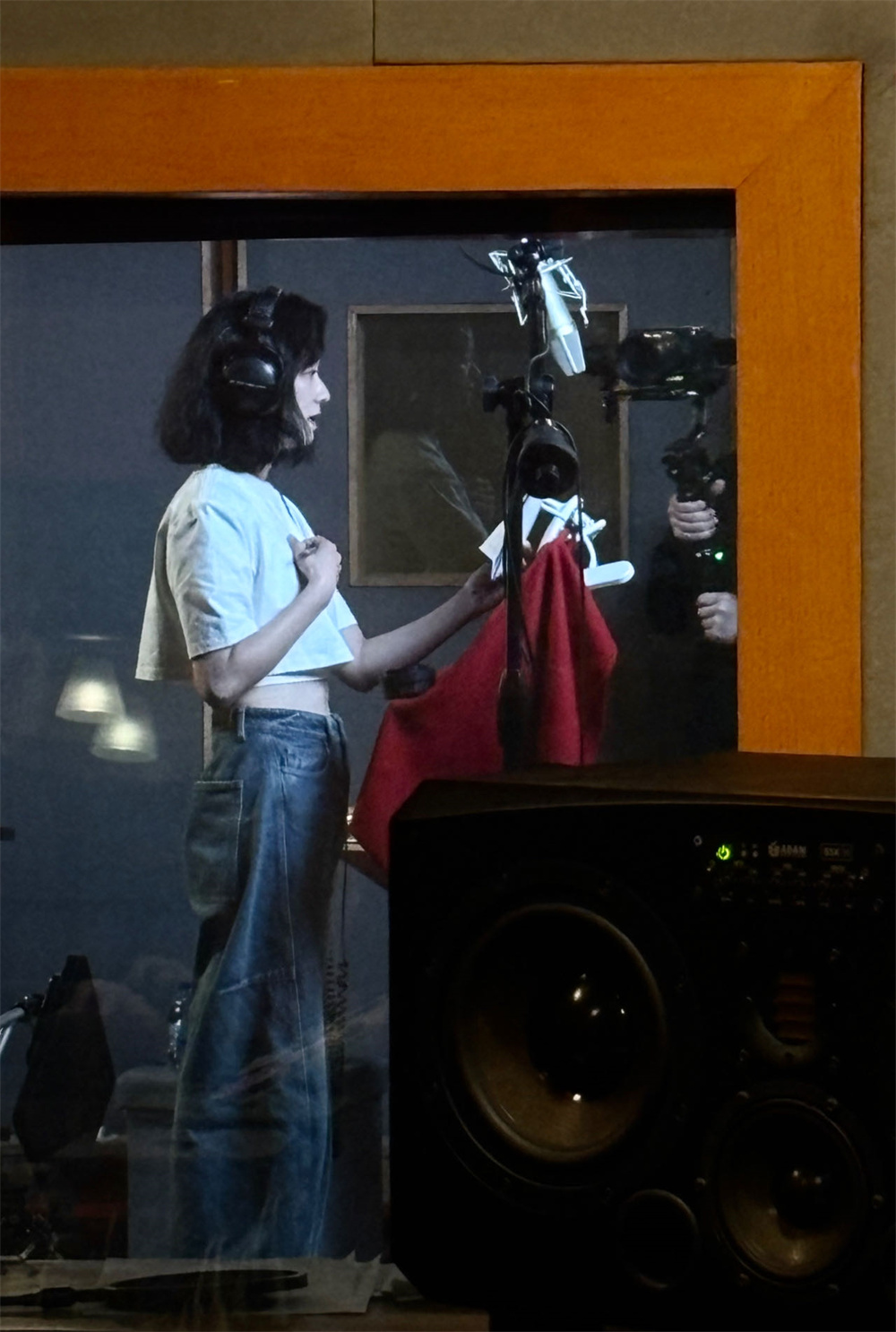
Actress Ni Hongjie dubbing the character Yu Xiaoying (played by Huang Zongying) in the film
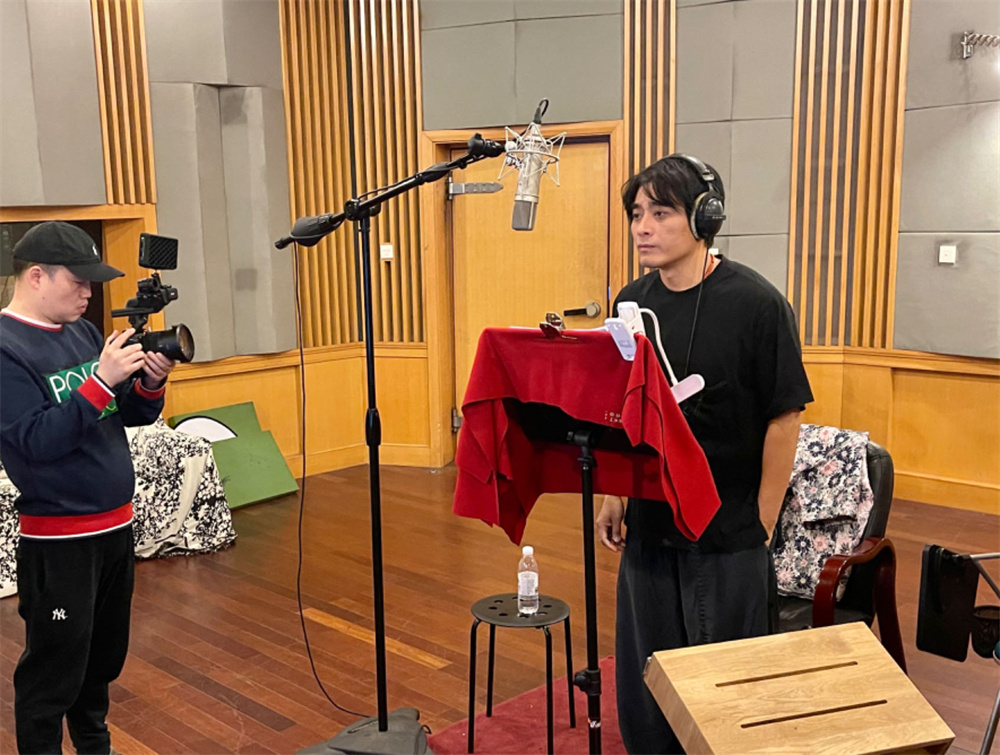
Chen Long in the dubbing room
There are also several big actors who played small supporting roles. For example, Zhang Zhizhi played a gangster, Li Baoluo played the principal, and Shi Ling played a guest doctor. They are all well-known veterans in the Shanghai film industry, and they must not just find someone to dub them. Even if they are small roles, they must invite heavyweight big names to join. For example, the voice of Li Baoluo was the famous director Zhang Jianya, and the voice of Shi Ling was the young director Wu Tiange. The dubbing of Zhang Zhizhi was done by the director Liu Feng himself. He is from Northeast China, but he has lived in Shanghai for decades and can easily speak the "pidgin" Shanghainese.
The third category of dubbing actors is the "second generation of film actors" in Shanghai. For example, Zheng Dali, the son of director Zheng Junli, dubbed the "house-watcher", Xu Pengle, the son-in-law of Xu Sangchu, the old director of Shanghai Film Studio, dubbed the "Minister of National Defense", and the descendants of famous actors such as Zhang Ruifang, Wu Yigong, and Huang Shuqin, Zheng Dasheng, Wu Tiange, and Zhu Feng... also dubbed a few minor roles in the Shanghainese version. No matter who they dubbed, as long as they participated, they would inevitably establish a special spiritual connection between them and their elders, between the past and the present, and between history and the contemporary.
Finally, we also invited several popular bloggers who promote Shanghai dialect and local culture on their own media to participate in the dubbing, such as "Old Beijinger Living in Shanghai" Uncle Fu (Yu Fu) and Shanghai dialect comedy blogger G Sengdong (Qian Shengdong). The purpose of inviting them is to let today's young people rediscover the heritage and charm of classics in a way that they are familiar with and love.
Shanghainese dubbing is to reshape the characters and their lives in dialect
I remember when dubbing started, a professor from the Beijing Film Academy probably heard some news and wrote me a private message saying, "If the water is too clear, there will be no fish." You must not understand Shanghainese too uniformly. It is better to have some southern and northern accents, with different dialects. This is the true face of Shanghainese at that time. This professor is from Shanghai, and his advice is very pertinent and to the point.
In fact, this is also our dubbing team's understanding of the Shanghai dialect 70 or 80 years ago. The so-called "five regions coexisting" living environment has created the complexity and tolerance of the Shanghai dialect. It is a dialect with "pidgin" characteristics. The Shanghai dialect should be mixed with Ningbo dialect, Suzhou dialect, Yangzhou dialect... Especially for a plot like "Crows and Sparrows" that shows the life of Shanghai's petty citizens, only the southern and northern accents and local dialects can be down-to-earth. If everyone speaks standard Shanghai dialect, it will appear rigid and fake.
This is particularly evident in Xiao Guangbo. In the Mandarin version, he sings Yue Opera, imitates the Fenghua accent of "President Jiang", shouts "I'm rich" in Shanghainese, and curses in Northern Jiangsu dialect... Zhao Dan uses this changeable language to vividly portray the multifaceted personality of a small person struggling to survive and enjoying himself. But it adds difficulty to Qian Cheng's dubbing. However, in his eyes, these do not seem to be a problem. Whether it is "Yue Opera", "lecture", "shouting", or "swearing", he can accurately grasp them. Especially the sentence "What the hell are you" when Xiao Guangbo curses the monkey in Northern Jiangsu dialect! It is as if there is divine help, and it directly breaks the defense of a group of people outside the recording studio and laughs so hard that we can't straighten our backs.
Mrs. Xiao, voiced by Zhang Zhihua, was the soul of the character. She had more than 180 lines, which were supposed to be recorded in one afternoon. Unexpectedly, Zhang Zhihua insisted on recording every word and sentence, and finally recorded for three full days. Mrs. Xiao had a crying scene, and Zhihua was full of emotions and passed it in one take. But she was not satisfied, thinking that her breath was not right and her breathing did not keep up with the rhythm of the character, so she asked the director to record another take until her breath matched the character perfectly.
Shangguan Yunzhu plays Mrs. Hua. At the beginning, we imagined that she could speak with a soft Suzhou accent. Teacher Qiao Zhen agreed with this idea and specially introduced Suzhou-born actress Han Xue to dub Shangguan. Unexpectedly, Han Xue can speak very authentic Shanghainese, and her Suzhou accent is not so obvious.
Later, in order to enhance the effect of this "pidgin", Mr. Qian Cheng specially invited the comic artist Mr. Aqing (Chen Guoqing) to make a guest appearance and dub various passers-by who did not even have a name, just like the "listening and using" in mahjong, filling in the gaps. For example, the small boss who squeezed in the crowd to play gold spoke in northern Jiangsu dialect. The hawker who collected old newspapers in the alley had a little Ningbo accent in his shouting.
Among them, the most rare is the "Shanghai dialect from 80 years ago". For example, the young radio couple called Mr. Hua, played by Sun Daolin, a "nerd". The Shanghainese script also wrote the three words "nerd". In the mouth of teacher Zhang Zhihua, "nerd" became "Si Du Tou". This is an old-school Shanghainese expression. Teacher Zhang Zhihua used to hear it from her mother, and this time she used it on the character. There is also "penicillin". When Yu Xiaoying and her bestie were playing around, she said it as "hope you die". These two words have nothing to do with each other in Mandarin, but in Shanghainese, they have become "homophonic puns" with hidden meanings.
In early June this year, after the dubbing and re-recording of the Shanghainese version was completed, the dubbing studio thoughtfully arranged an internal screening for some of the "second generation of filmmakers" in Shanghai, inviting the descendants of the main creators, including Zhao Dan, Huang Zongying, Wei Heling, Wu Yin, Sun Daolin, Shangguan Yunzhu, and Li Baoluo, to the screening. After the screening, people couldn't contain their excitement and joy, and started talking about it in the screening room. Zhao Dan, Huang Zongying's son Zhao Zuo, and Sun Daolin's daughter Sun Qingyuan all expressed high praise for the dubbing of the Shanghainese version. Sun Qingyuan also repeatedly asked us to help her convey her gratitude to Hu Ge. Wu Yin's daughter said that she felt that Zhang Zhihua's voice was so similar to her mother's, and it was actually different from her usual way of speaking. Wei Heling's son and daughter also lamented that when their father Wei Heling played Kong Youwen, he was only 40 years old, and there was still a big gap in age between him and the character. However, Mr. Qiao Zhen's dubbing eliminated this distance and gave the character a more vicissitudes of life sound quality, which was even more in line with the character's temperament than his father's original voice.
Zheng Dali, the son of director Zheng Junli, came to the recording studio on April 23, 2024 to dub the role. I remember that day he wrote a sentence full of affection in the WeChat group: "Today is the last day of the Shanghainese version of "Crows and Sparrows", which officially starts at 1 pm." "It seems that fate has arranged me to be here today, and I will never forget it." It turned out that April 23, 55 years ago, was the day when director Zheng Junli passed away.


